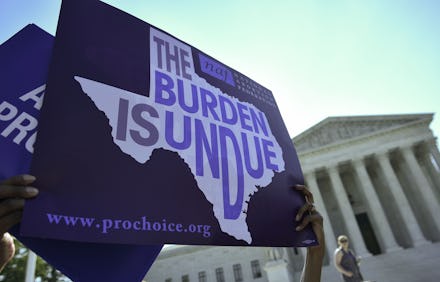While you weren't looking, these states tried to pass some truly garbage abortion laws

This week, legislators in the South seemed to be in a race to outdo each other to see who can pass the most restrictive, sneaky and downright unconstitutional anti-abortion legislation first.
South Carolina got the ball rolling with some proposed revisions to Regulation 61-12, an existing law outlining the daily functions of abortion clinics that hadn't been updated in two decades. The additions to the policy appear to narrow the window of time in which a person can have an abortion and require any woman who is married and living with her husband to obtain his consent before terminating a pregnancy.
Taking a cue from South Carolina's attempt to quietly pass unlawful abortion restrictions, Texas followed suit with a new bill that would require abortion providers to bury or cremate fetal remains.
According to Dallas Morning News, pro-choice advocates are making a "final push" to kill the legislation before the public comment period ends on Monday.
"It creates an undue burden on women who either have an abortion or a miscarriage," Geraldine Mongold, who attended a Wednesday rally protesting the bill, told the outlet. "It's a slippery slope, too. ... They're taking away our rights to own our own bodily fluids and products."
Jezebel explains in its report that since the legislation is "being treated as a bureaucratic rule," instead of as a bill, there are very few guidelines in place for legislators, who, after Monday, are pretty much free to do with the bill as they see fit.
"Nobody has to listen to the comments, take them into effect, or, in this case, consider if the rule is actually supported by doctors and public health experts," Jezebel reported.
As pro-choice advocates in Texas wait with bated breath to learn of the law's fate, many in Alabama are breathing a sigh of relief. On Thursday, federal judge struck down a bill mandating abortion clinics be at least 2,000 feet away from K-8 public schools and another which sought to ban a second-trimester abortion.
"This burden would become particularly devastating for low-income woman," Judge Myron Thompson wrote in his official ruling, noting that it would require people seeking abortions to travel long distances to one of the three clinics in the state that offered those procedures, according to Reuters.
Thompson ruled that the proposed laws, which were slated to go into effect on Aug. 1, were likely unconstitutional.
Opponents to abortion rights are always trying to making it harder, if not impossible, for people to receive abortions. But these recent attempts come amid a presidential election with a Republican nominee who would seek to overturn Roe v. Wade — the Supreme Court ruling that has provided the constitutional basis for judges to thwart these many attempts.
Following Donald Trump's assertion at the final debate that he would appoint anti-Roe v. Wade justices to the Supreme Court, Planned Parenthood Action Fund vice president Dawn Laguens, said in a statement to USA Today, "There is so much at stake for women and their access to reproductive health and rights in this election, and all Trump is doing is promising to take us backwards."